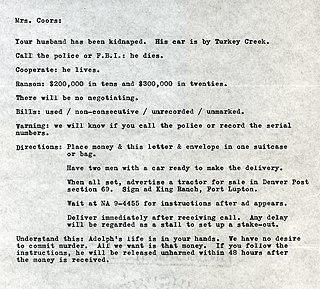
In criminal law, kidnapping is the unlawful confinement of a person against their will, often including transportation/asportation. The asportation and abduction element is typically but not necessarily conducted by means of force or fear: the perpetrator may use a weapon to force the victim into a vehicle, but it is still kidnapping if the victim is enticed to enter the vehicle willingly.
Grievous bodily harm is a term used in English criminal law to describe the severest forms of battery. It refers to two offences that are created by sections 18 and 20 of the Offences against the Person Act 1861. The distinction between these two sections is the requirement of specific intent for section 18; the offence under section 18 is variously referred to as "wounding with intent" or "causing grievous bodily harm with intent", whereas the offence under section 20 is variously referred to as "unlawful wounding", "malicious wounding" or "inflicting grievous bodily harm".
Assault causing bodily harm is a statutory offence of assault in Canada with aggravating factors. It is committed by anyone who, in committing an assault, causes bodily harm to the complainant. It is the Canadian equivalent to the statutory offence in England and Wales of assault occasioning actual bodily harm. In Canada, a consensual fight is not considered an assault, but one cannot consent to an assault causing bodily harm.
Assault occasioning actual bodily harm is a statutory offence of aggravated assault in England and Wales, Northern Ireland, the Australian Capital Territory, New South Wales, Hong Kong and the Solomon Islands. It has been abolished in the Republic of Ireland and in South Australia, but replaced with a similar offence.
In criminal law and in the law of tort, recklessness may be defined as the state of mind where a person deliberately and unjustifiably pursues a course of action while consciously disregarding any risks flowing from such action. Recklessness is less culpable than malice, but is more blameworthy than carelessness.
Common assault is an offence in English law. It is committed by a person who causes another person to apprehend the immediate use of unlawful violence by the defendant. In England and Wales, the penalty and mode of trial for this offence is provided by section 39 of the Criminal Justice Act 1988.
In the English law of homicide, manslaughter is a less serious offence than murder, the differential being between levels of fault based on the mens rea or by reason of a partial defence. In England and Wales, a common practice is to prefer a charge of murder, with the judge or defence able to introduce manslaughter as an option. The jury then decides whether the defendant is guilty or not guilty of either murder or manslaughter. On conviction for manslaughter, sentencing is at the judge's discretion, whereas a sentence of life imprisonment is mandatory on conviction for murder. Manslaughter may be either voluntary or involuntary, depending on whether the accused has the required mens rea for murder.
Conspiracy to defraud is an offence under the common law of England and Wales and Northern Ireland.
Obtaining pecuniary advantage by deception was formerly a statutory offence in England and Wales and Northern Ireland. It was replaced with the more general offence of fraud by the Fraud Act 2006. The offence still subsists in certain other common law jurisdictions which have copied the English criminal model.
An offensive weapon is a tool made, adapted or intended for the purpose of inflicting physical injury upon another person.

The Gaming Act 1845 was an Act of the Parliament of the United Kingdom. The Act's principal provision was to deem a wager unenforceable as a legal contract. The Act received royal assent on 8 August 1845. Sections 17 and 18, though amended, remained in force until 1 September 2007.

The Interpretation Act 1978 is an Act of the Parliament of the United Kingdom. The Act makes provision for the interpretation of Acts of Parliament, Measures of the General Synod of the Church of England, Measures of the Church Assembly, subordinate legislation, "deeds and other instruments and documents," Acts of the Scottish Parliament and instruments made thereunder, and Measures and Acts of the National Assembly for Wales and instruments made thereunder. The Act makes provision in relation to: the construction of certain words and phrases, words of enactment, amendment or repeal of Acts in the Session they were passed, judicial notice, commencement, statutory powers and duties, the effect of repeals, and duplicated offences.
Polygamous marriages may not be performed in the United Kingdom, and if a polygamous marriage is performed, the already-married person may be guilty of the crime of bigamy under section 11 of the Matrimonial Causes Act 1973.
Rape is a statutory offence in England and Wales. The offence is created by section 1 of the Sexual Offences Act 2003:
(1) A person (A) commits an offence if—
(2) Whether a belief is reasonable is to be determined having regard to all the circumstances, including any steps A has taken to ascertain whether B consents.
(3) Sections 75 and 76 apply to an offence under this section.
(4) A person guilty of an offence under this section is liable, on conviction on indictment, to imprisonment for life.

R v Jordan (1956) 40 Cr App R 152 was an English criminal law case that has been distinguished by two later key cases of equal precedent rank for its ruling that some situations of medical negligence following a wounding are those of breaking the chain of causation, capable of absolving a person who has inflicted bodily harm of guilt for an offence of the severity resulting from a consequent decline in bodily condition, in particular, homicide. The facts were ones whereby a wound was should to be almost certain, with no treatment, to heal itself. The medical attempt to facilitate recovery from the wound resulted in a non-prosecutable death as it was shown to have been negligent and principally an antibiotic error though far from unknown and well-intentioned. The appropriate charge(s) would be ones relating to wounding or disorder of the defendant, rather than homicide which could not have been said to have been caused by the defendant in any meaningful way.
R v. Fellows; R v. Arnold [1997] 1 Cr App R 244; [1997] 2 All E.R. 548, is a prominent English case on the statutory interpretation of section 1 of the Protection of Children Act 1978, and the Obscene Publications Act 1959, the definitions have since been amended by the Criminal Justice and Public Order Act 1994. The Court of Appeal held that data on a computer that represents the original photograph is a copy of a photograph under the 1978 Act, therefore, downloading an indecent photograph from the internet constitutes making a copy or reproduction of an indecent photograph.
R v Lawence may refer to:
Soliciting to murder is a statutory offence of incitement in England and Wales and Northern Ireland and the Republic of Ireland.
Conspiracy to murder is a statutory offence defined by the intent to commit murder.
The expression sexual intercourse has been used as a legal term of art in England and Wales. From its enactment to its repeal on the 1 May 2004, section 44 of the Sexual Offences Act 1956 read:
Where, on the trial of any offence under this Act, it is necessary to prove sexual intercourse, it shall not be necessary to prove the completion of the intercourse by the emission of seed, but the intercourse shall be deemed complete upon proof of penetration only


